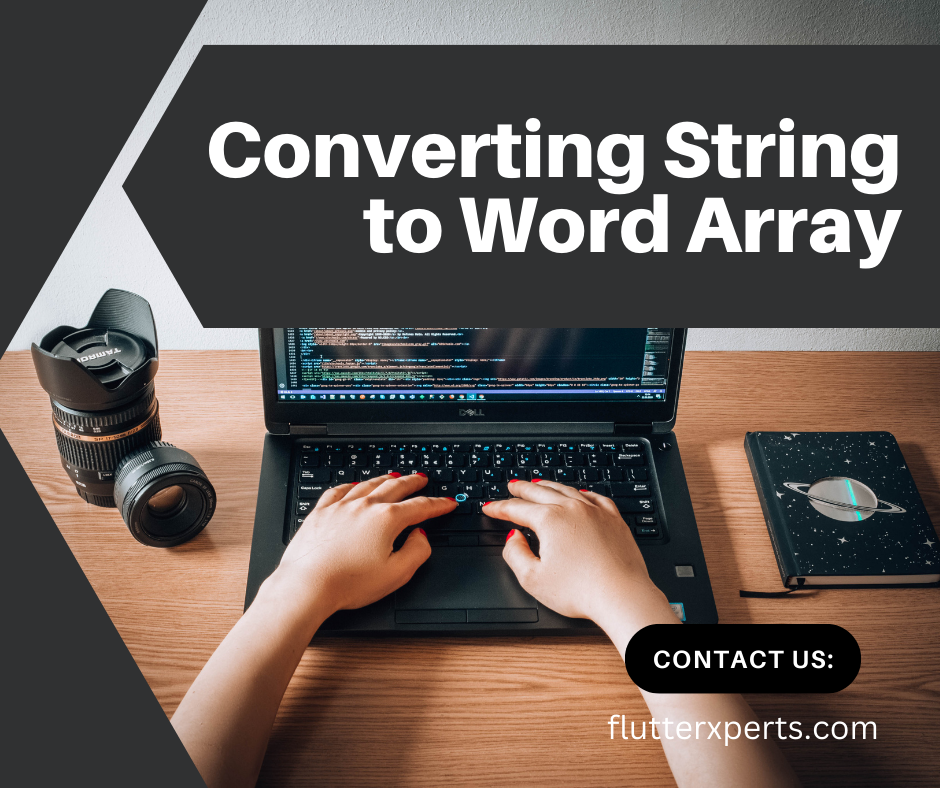How to Convert a String into an Array of Words in Flutter
Introduction
In mobile application development, working with strings and arrays is a common task. At times, you might encounter situations where you need to break down a string into its individual words to perform specific operations. Flutter, being a versatile and popular framework for mobile app development, offers various methods to achieve this. In this blog, we will explore different techniques to convert a string into an array of words in Flutter.
Understanding String and Array Data Types
Before diving into the conversion process, let’s briefly understand what strings and arrays are.
A string is a sequence of characters, such as “Hello, World!” or “Flutter is amazing.” Strings are used to represent text and are immutable, meaning their values cannot be changed after creation.
On the other hand, an array is a collection of elements, where each element has a unique index. In Flutter, arrays are represented using the List class. Lists can hold elements of the same data type or a combination of different data types.
Why Convert a String to an Array of Words?
Converting a string into an array of words has several use cases in mobile app development. Some of the common scenarios include:
- Text Analysis: When you need to analyze the frequency of words or perform operations on individual words, converting the string to an array of words becomes essential.
- Text Processing: For tasks like word counting, searching for specific words, or text filtering, it is more efficient to work with arrays of words rather than entire strings.
- Language Processing: In multilingual applications, breaking down sentences into arrays of words allows for more straightforward language processing and translation.
Now that we understand the importance of string-to-array conversion, let’s explore various methods to achieve it.
Methods to Convert a String into an Array of Words
4.1. Using Split() Method
The most straightforward and widely used method to convert a string into an array of words is by using the split() method. This method is available for strings and allows you to specify a delimiter or separator to split the string into an array.
String sentence = "Flutter makes mobile app development enjoyable";
List<String> words = sentence.split(" ");
print(words); // Output: ["Flutter", "makes", "mobile", "app", "development", "enjoyable"]
In the example above, we used the space character as the separator, which splits the sentence into words wherever there is a space.
4.2. Manual Conversion using Regular Expressions
If you need more control over how the string is split or if you want to handle more complex scenarios, using regular expressions for the conversion can be a powerful approach. Flutter provides the RegExp class to work with regular expressions.
String sentence = "Hello, World! Welcome to Flutter.";
RegExp regExp = RegExp(r"\W+");
List<String> words = sentence.split(regExp);
print(words); // Output: ["Hello", "World", "Welcome", "to", "Flutter"]
In the above example, we used the regular expression \W+ to split the sentence by any non-word characters, effectively removing punctuation.
4.3. Exploring Third-Party Libraries
Flutter’s ecosystem includes a vast range of third-party libraries that offer additional functionalities, including string manipulation. Some of these libraries provide specific methods for splitting strings into arrays of words, which might be useful depending on your project’s requirements.
One such library is string_splitter, which allows you to split strings based on various conditions like white spaces, punctuation, or custom separators.
To use string_splitter, add the package to your pubspec.yaml file and import it into your Dart code:
import 'package:string_splitter/string_splitter.dart';
String sentence = "Mobile app development is fascinating!";
List<String> words = splitWords(sentence);
print(words); // Output: ["Mobile", "app", "development", "is", "fascinating"]
The splitWords() function from the string_splitter library efficiently handles the conversion without the need for custom regular expressions.
Best Practices for Handling String to Array Conversion
Converting strings to arrays of words can be a straightforward task, but there are some best practices to keep in mind:
- Error Handling: Always consider potential edge cases, such as empty strings or null values, and handle them gracefully to avoid runtime errors.
- Performance Considerations: When working with large strings, be mindful of the performance impact of the chosen conversion method. Regular expressions, for instance, might be less efficient for extensive texts.
- Encoding and Locale: Be aware of the text encoding and locale of your strings, especially when dealing with multilingual content.
Examples and Code Snippets
6.1. Example 1: Convert Simple String to Array
Let’s start with a basic example of converting a simple sentence into an array of words using the split() method:
String sentence = "Flutter is fantastic for mobile app development";
List<String> words = sentence.split(" ");
print(words); // Output: ["Flutter", "is", "fantastic", "for", "mobile", "app", "development"]
In this example, we used the space character as the separator to split the sentence into individual words.
6.2. Example 2: Handling Punctuation and Special Characters
String sentence = "Hello, Flutter! Are you ready?";
RegExp regExp = RegExp(r"\W+");
List<String> words = sentence.split(regExp);
print(words); // Output: ["Hello", "Flutter", "Are", "you", "ready"]
The above example demonstrates using a regular expression to handle punctuation marks and special characters, effectively extracting only the words from the sentence.
6.3. Example 3: Custom Separators and Delimiters
String sentence = "Apples|Bananas|Oranges|Mangos";
List<String> words = sentence.split("|");
print(words); // Output: ["Apples", "Bananas", "Oranges", "Mangos"]
In this example, we used the vertical bar (|) as the separator to split the sentence into an array of fruits.
Tips for Efficient String and Array Manipulation
To make your string and array manipulation more efficient, consider the following tips:
- Use StringBuffer: When constructing long strings dynamically, use
StringBufferinstead of concatenating strings directly. It reduces memory overhead and improves performance. - Avoid String Interpolation in Loops: If you have a loop that appends strings, prefer using
StringBufferor similar techniques instead of string interpolation ($variable) to avoid unnecessary object creations. - Use Iterable’s forEach: When iterating over a list, prefer using
Iterable‘sforEach()method instead of traditionalforloops for concise and more readable code.
Conclusion
In this blog, we explored various methods to convert a string into an array of words in Flutter. We discussed using the split() method with different separators, leveraging regular expressions for custom splitting, and exploring third-party libraries for added functionalities. Additionally, we covered best practices for handling string-to-array conversions and provided code examples for better understanding.
Efficient string and array manipulation is crucial for mobile app development, and Flutter provides the necessary tools and libraries to handle such tasks with ease. By employing the techniques discussed here, you can enhance your app’s text processing capabilities and provide a seamless user experience.
Remember to consider performance considerations when working with large strings, and always be mindful of error handling and text encoding to ensure robust and reliable string-to-array conversions in your Flutter applications. Happy coding!


